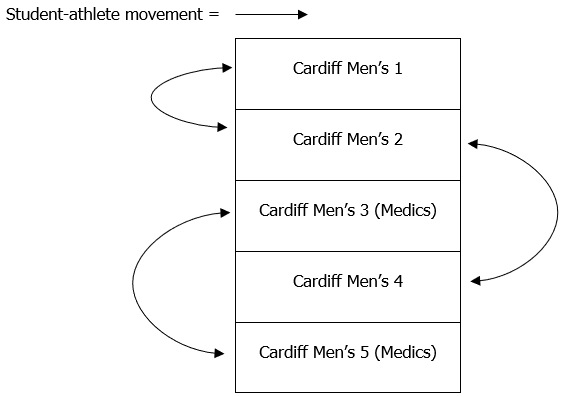SQU i The BUCS Squash Championships shall be conducted in accordance with the following BUCS sport specific regulations, the BUCS general regulations, and the World Squash Federation Rules of Squash. Further event specific requirements, rules, and regulations will be contained within the entry and pre-event information for each Championship.
SQU ii In the event that these regulations contradict the BUCS general regulations, these BUCS sport specific regulations will supersede, unless specifically stated otherwise.
SQU iii In the event that these regulations contradict the World Squash Federation Rules of Squash, these BUCS sport specific regulations will supersede, unless specifically stated otherwise.
SQU 1 Championships BUCS will host annually the following Championships:
SQU 1.1 Individual Championships The programme shall include the events listed in Appendix 1 (‘BUCS Competition Offer and Associated BUCS Points’), subject to entry numbers.
SQU 1.2 Team Championships The programme shall include leagues and knockout competitions as per BUCS general regulations, Appendix 1 (‘BUCS Competition Offer and Associated BUCS Points’) and Appendix 10 (‘BUCS Promotion, Relegation and Knockout Information’).
SQU 2 For all competitors under 19 years of age, eye protectors must be worn for all matches, as per England Squash regulations.
Individual Championships
SQU 3 Tournament structure and entries See Appendix 1 (‘BUCS Competition Offer and Associated BUCS Points’) and the entry information for all competitions offered as part of the BUCS Squash Individual Championships. All competition specific event information will be available in the event entry information and pre-event information.
SQU 3.1 In order to accommodate the large numbers of individual entries received each year, the entries will be distributed into an appropriate number of graded-type draws based upon the information on playing standard provided when the entries are made. Players will also be seeded according to NGB recommendations and results in the current season’s BUCS Team Championships as well as details of current form/playing standard provided when the entries are made.
SQU 3.2 The draw shall be made in the presence of a neutral referee.
SQU 3.3 Wherever possible players from the same institution shall be placed in different quarters of the draw.
SQU 3.4 The Tournament shall be played on a straight knockout basis, with each match being the best of five games.
SQU 4 Disputes at events In line with REG 7.7, should a dispute occur at an event, the event appeal panel for Squash shall comprise of the Tournament Director and a BUCS Staff Member.
Team Championships
SQU 5 There shall be separate Team Championships for Men and Women.
SQU 6 Fixture administration and arrangements
SQU 6.1 Court bookings Failure to book the minimum prescribed time below will result in the home team forfeiting any rubbers not completed should the match not be completed:
|
|
5 players |
4 players |
3 players |
|
First court |
2 hours |
1.5 hours |
1 hour |
|
Second court |
2.5 hours |
1.5 hours |
1.5 hours |
SQU 6.2 Order of play The order of play for all matches shall be as follows:
|
|
5 players |
4 players |
3 players |
|
First court |
String 5 then 4 |
4 then 2 |
3 |
|
Second court |
3 then 1 then 2 |
1 then 3 |
1 then 2 |
SQU 7 Team selection This regulation supersedes REG 11.1.
SQU 7.1 All individuals in a team must be from the same Playing Entity and meet the individual eligibility requirements of REG 4.
SQU 7.2 In order to be selected in a team, all individuals must be registered on BUCS Play as a participant.
SQU 7.3 Where a Playing Entity has more than one team in a Championships (Men’s/Women’s), and more than one fixture scheduled across these teams on a given day, priority must be given to the highest ranked team and then in descending order through their teams should the Playing Entity be unable to fulfil all scheduled fixtures. For example, a Playing Entity may NOT concede a walkover at second team level, while continuing to field a lower ranked team on the same day. Matches played in contravention of this regulation will be awarded as a walkover to the opposition, or in certain circumstances, be voided.
SQU 7.3.1 For possible exceptions due to ‘Ring Fencing’ of teams, refer to SQU 7.5.
SQU 7.3.2 Involuntary walkovers may be granted in exceptional circumstances if applied for in accordance with walkover regulations in REG 13 meaning that SQU 7.3 would be suspended in some instances. Application to suspend SQU 7.3 must be made to the BUCS Executive in advance of affected fixtures.
SQU 7.4 Individuals may not be selected (listed on a team sheet) for different teams on the same day.
SQU 7.5 Ring Fenced teams Ring Fenced teams will be denoted by their specific group being named in brackets, e.g. (Medics). Information on how to apply for Ring Fencing can be found in REG 2.6.7. Ring Fencing of teams allows for a variation to the standard team selection regulations by allowing a Playing Entity to identify separate groupings of student-athletes such as ‘Medics’ and as a result have separate groupings to which the team selection regulations shall apply. The below is an illustration of how team selection/student-athlete movement operates when a Playing Entity has Ring Fenced teams.

SQU 7.6 Ranking lists
SQU 7.6.1 There shall be separate ranking lists for the Men's and Women's Championships. The ranking lists will be available here for ease of reference.
SQU 7.6.2 Prior to the start of the season, each Playing Entity must submit a ranked list of all the players they expect to use across their teams. These lists must be submitted no later than the deadline in the BUCS Sport Specific Affiliations Document and must feature enough individuals to field the number of teams entered. Failure to submit this information will result in sanctions being imposed as outlined in the BUCS Sport Specific Affiliations Document.
SQU 7.6.3 Following the initial ranking deadline passing, ranking lists will be locked and cannot be changed except in the following circumstances:
SQU 7.6.3.1 There shall be two re-ranking windows, during which Playing Entities can change the ranked order of existing players on their ranking list and/or remove players from their ranking list. The dates for the re-ranking windows will be displayed in the BUCS Sport Specific Affiliations Document. Changes to ranking lists made during a re-ranking window will only come into effect at the end of the window.
SQU 7.6.3.2 Playing Entities may request to add players in at any positions on their ranking list at any time during the season by emailing [email protected]. Requests must be submitted to, and approved by, the BUCS Executive in advance of the players competing in any fixtures so they should be made as far in advance of affected fixtures as possible.
SQU 7.6.4 The order on their ranking list shall be determined by each Playing Entity ranking their players in genuine order of playing strength, with their best player ranked as 1 and the second best as 2 and so on. The order does not need to be in accordance with any external ratings/ranking systems, but Playing Entities ranking players out of ratings order may be requested to justify their ranking lists to the BUCS Executive. If the BUCS Executive deems that a Playing Entity has deliberately not ranked players in genuine order of playing strength and/or has failed to justify why players are not ranked in accordance with any external ratings/rankings systems then this will result in a charge of misconduct being raised in accordance with REG 5.
SQU 7.6.5 Teams for a fixture day (across all leagues, knockout competitions and/or playoffs) must be selected in rank order and teams must be selected as if all teams were playing that day. This applies across all teams, e.g. A player ranked number 8 cannot play in the 1st team if the player ranked number 7 is playing for a lower team's match that day, or a player ranked number 1 should not play for the 2nd team because the 1st team do not have a match that day.
SQU 7.6.6 Based on the number of teams entered by a Playing Entity and the levels at which these teams play and therefore how many players constitute a team, ranked players will be shown on ranking lists in coloured groups representing a team level at which whilst ranked in that position they are not eligible to play below (including league, playoff and knockout competition matches). The colour designations will be as follows: 1st Team = Red, 2nd Team = Blue, 3rd Team = Yellow, 4th Team = Green, 5th Team = Pink. Any further players ranked below the lowest level of teams a Playing Entity has entered will not have a highlighted colour.
SQU 7.6.7 Individuals within a team must play in rank order in all matches.
SQU 7.6.8 Playing Entities deemed by the BUCS Executive to have exploited these ranking list regulations and/or manipulated their ranking list could face a misconduct charge raised in accordance with REG 5. Examples of what might be considered as misconduct are:
- A Playing Entity listing from the start of the season an individual who will be joining their institution in January and so at this time is not a current student/player.
- A Playing Entity found to have listed on their ranking list a fake player.
- A Playing Entity found to have not removed during a re-ranking window an individual who it was known at that time could no longer play for the remainder of the season, for example because the individual is no longer eligible under BUCS REG 4.
SQU 7.7 Team size
SQU 7.7.1 Men’s Premier Tier/Tier 1/Tier 2 and National Championship/Trophy Teams shall consist of five players.
SQU 7.7.2 Men’s Tier 3 and below Teams shall consist of three players.
SQU 7.7.2.1 Three player teams will only be promoted to a Tier where teams of five players are required if they are able to guarantee five players for the following season.
SQU 7.7.3 Men’s Conference Cup Teams shall generally consist of five players, unless one or both teams involved in a match are from Tier 3 or below, in which case three players shall be the requirement (unless both teams agree to play with five players).
SQU 7.7.4 Women’s Premier Tier and National Championship Teams shall consist of five players.
SQU 7.7.5 Women’s Tier 1 and below and National Trophy/Conference Cup Teams shall consist of four players.
SQU 7.7.5.1 For those teams that are eligible for Promotion to the Premier Tier, they should be aware that for the Tier 1 playoff competition that precedes the National Championship, teams shall consist of five players as these playoff fixtures shall be played to the regulations of the Premier Tier.
SQU 7.7.5.2 For those teams that qualify for the National Championship they should be aware that for these fixtures teams shall consist of five players.
SQU 7.7.6 Where teams should consist of five players, a minimum of three players must play; where teams should consist of four players, a minimum of three players must play; and where teams should consist of three players, a minimum of two players must play.
SQU 7.7.7 A team unable to field the minimum number of players required shall concede a walkover, however institutions/Playing Entities with multiple teams should be aware of SQU 7.3.
SQU 7.7.8 A team fielding enough players to fulfil the minimum number of players required, but not a full team, shall be permitted to play but shall concede the rubbers they are unable to fulfil. In such circumstances it is expected that the team would notify their opposition as soon as possible after it is known that they will not be fielding a full team of this, specifying how many players will be fielded. For the avoidance of doubt, if notice of being short of players is given to the opposition in advance of the fixture, the opposition team is only required to bring enough players to match the adjusted team size and the appropriate number of rubbers shall still be conceded. Teams found to be fielding less than a full team and conceding rubbers for multiple fixtures may face disciplinary action.
SQU 7.7.9 If a team arrives with a full complement of players, and one or more of those players is found to be unable and/or unwilling to play a competitive match in their designated position prior to the fixture commencing, then they shall be removed from the team and the fulfilment of the highest rubbers shall be prioritised with any lower rubbers the team is not able to fulfil being conceded.
SQU 7.7.10 If a team arrives with a full complement of players, and one or more of those players is found to be unable and/or unwilling to play a competitive match in their designated position after the fixture has commenced, then the team will concede that rubber and all rubbers below, regardless of whether they have already played/won any of these rubbers. The exception to this is that in knockout competitions both teams may agree to play best of three for a dead rubber.
SQU 7.7.11 Conceded rubbers will be scored as a 3-0 win to the opposition (11-0, 11-0, 11-0). A winning team who has had games conceded to them will still be entitled to the applicable bonus points for the full team size. Bonus points for the match should still be calculated based on what the correct team size should have been.
SQU 7.7.12 For the National Championship and National Trophy Finals teams are expected to field a full complement of players or face a fine of £500.
SQU 8 Scoring system
SQU 8.1 The World Squash Federation Rules of Squash shall be used including the PAR 11 scoring system. Each player shall play the correspondingly ranked player of the opposing team, for the best of five games. The team winning the majority of rubbers shall be the match winners.
SQU 8.1.1 Women’s Tier 1 and below and Trophy/Conference Cup Where a match ends two rubbers each, SQU 9 will be applied to identify the winner.
SQU 9 Ties in knockout competition matches In the event of a draw in a knockout fixture, the winner shall be determined as follows:
SQU 9.1 The team winning the highest number of games. If a tie still results;
SQU 9.2 The team winning the highest number of points. If a tie still results;
SQU 9.3 The team which won the first string match (i.e. 1v1).
SQU 10 League points
SQU 10.1 League points will be awarded to each team according to the number of games won. The winning team will also score additional bonus points: 5 players per team = 5 bonus points, 4 players per team = 4 bonus points, 3 players per team = 3 bonus points.
SQU 10.2 Where a walkover has been awarded/conceded (REG 13), the non-offending team will be given the maximum number of points available to them and the offending team will be deducted 10 points.
SQU 10.3 No points will be awarded to either team in the case of a void fixture.
SQU 11 Calculating final league positions
SQU 11.1 Final league positions will be primarily based on league points accumulated. However, should there be any ties on points within a league, they shall be split by the following sequential system:
SQU 11.2 A team tied on points who has conceded at least one voluntary walkover shall automatically be placed below any other tied teams who have conceded fewer voluntary walkovers. If a tie still exists, then SQU 11.3 or SQU 11.4 shall be followed as applicable.
SQU 11.3 Tie between two teams
SQU 11.3.1 The result between the teams will be the determining factor in placing one team above the other. Where fixtures are played on a ‘home’ and ‘away’ basis, the aggregate score of the two matches will determine the higher placed team. If this does not determine the higher placed team;
SQU 11.3.2 Rubbers and games data shall be used as per SQU 11.3.3 – SQU11.3.5. If the tie on league points has been effected by any walkovers conceded to either of the teams or any void fixtures, all the relevant results against the team(s) which conceded the walkover(s) or the team(s) involved in the void fixtures (i.e. all the results between the teams tied on league points and the team(s) conceding the walkover(s)/void match(es)) will be removed from the results table and the recalculated rubbers and sets data shall be used.
SQU 11.3.3 The team with the higher rubbers difference shall be deemed the higher placed team. If a tie still exists;
SQU 11.3.4 The team with the higher number of rubbers won shall be deemed the higher placed team. If a tie still exists;
SQU 11.3.5 The team with the higher games difference shall be deemed the higher placed team. If a tie still exists;
SQU 11.3.6 If the higher placed team cannot be determined from the system above, then this shall be determined by the toss of a coin by the BUCS Executive.
SQU 11.4 Tie between three or more teams
SQU 11.4.1 Where three or more teams are tied on league points, a table shall be formed to calculate their final league positions using the results between the relevant teams as per SQU 11.4.2 – SQU 11.4.5.
SQU 11.4.2 The teams tied will be ranked based on league points accumulated (the higher the better). If a tie still exists;
SQU 11.4.3 The teams tied will be ranked based on rubbers difference (the higher the better). If a tie still exists;
SQU 11.4.4 The teams tied will be ranked based on the number of rubbers won (the higher the better). If a tie still exists;
SQU 11.4.5 The teams tied will be ranked based on games difference (the higher the better).
SQU 11.4.6 If a tie cannot be broken using the system above, then the final league positions of any teams still tied shall be determined by the toss of a coin by the BUCS Executive.
SQU 12 Scorecards Institutions/Playing Entities are required to maintain accurate records* of the matches played by their teams in case of a tie on points within a league which requires additional score information to that on BUCS Play. In such circumstances, the BUCS Executive will contact the relevant institutions/Playing Entities for details of all their league matches in order to separate the teams.
* ‘Accurate records’ are taken to mean precise details of all aspects of the fixture including rubbers, games and points; won and lost.
SQU 13 Incomplete fixtures
SQU 13.1 In the event of a fixture being incomplete with no fault on either side, then the fixture shall be replayed. The home team for the replay will be determined by coin toss, undertaken by the BUCS Executive.
SQU 13.2 In the event of a fixture being incomplete due to a late start, with a team at fault, their opposition may claim any rubbers not completed or unplayed.
SQU 13.3 In the event of a fixture being incomplete due to an institution/Playing Entity booking insufficient court time, their opposition may claim any rubbers not completed or unplayed.
SQU 14 Match balls The Dunlop Revelation Double Spot or an alternative WSF approved ball shall be used.
SQU 14.1 Women’s Tier 2 and below league matches and Conference Cup matches A single yellow spot ball shall be used.
SQU 15 Premier Tier/National Championship specific regulations
SQU 15.1 The National Premier league shall be played in two stages. Each stage shall be completed during a weekend competition involving three matches per team using the same format as England Squash’s inter-county Championship.
SQU 15.2 For Stage 1, the eight National Premier teams shall be divided on a broadly geographical basis into ‘North’ and ‘South’ groups of four teams each (on the basis of minimising travel distance/time as a prescribed method of deciding upon the composition of the two groups).
SQU 15.3 Following completion of the Stage 1, the top team from each group will qualify for the upper tier group and compete for places 1-4. The bottom team from each group will be placed in the lower tier group and compete for places 5-8. The teams finishing in 2nd place in their group will play against the 3rd place team from the other group in a one off playoff. The 2nd place team will be at home. The winner will qualify for the upper tier group and the loser shall go into the lower tier.
SQU 15.4 Venues for both Stage 1 and Stage 2 shall be selected on the basis of facility availability/cost and reasonable travel time for teams through a short tender process. Wherever possible, for Stage 1 both Men’s and Women’s events shall be played at the same venue in each of the ‘North’ and ‘South’ groups. Costs will be split equally between all competing teams.
SQU 15.5 All eight teams shall progress to the National Championship knockout competition, where they will be placed at the last 16 stage according to their finishing position in the National Premier league.
SQU 15.6 Players retiring during a match may not play again in the same weekend. The only exception to this rule is if the cause of retirement is considered transitory (e.g. nose bleed, cramp, migraine, vomiting) and that the player has recovered fully for their next match. If the player then retires during a second match, their string and all strings below them shall be forfeited.
SQU 15.7 Promotion to and Relegation from the Premier Tier
SQU 15.7.1 The 1st, 2nd and 3rd place finishers in the National Premier league shall retain their place. They shall compete against the three ‘best performing’ runners-up across Tier 1 (Subject to them being a 1st team. Where they are not, the team in 3rd place will be considered, if they are an eligible 1st team and so on) in the last 16 stage of the National Championship. These fixtures are solely knockout competition fixtures and have no bearing on promotion or relegation.
SQU 15.7.2 The 4th – 8th place finishers shall play against the five Tier 1 league winners (Subject to them being a 1st team. Where they are not, this place will be offered to the team in 2nd place, if they are an eligible 1st team and so on), in the National Championship round of 16. The winners of these round of 16 matches will become the additional five Premier Tier teams for the following season.
SQU 15.7.2.1 The five Tier 1 teams shall have the opportunity to determine seeding for the round of 16 draw, through the organisation of a Tier 1 playoff competition.
SQU 15.7.2.2 The Tier 1 playoff competition shall take place on a weekend as listed in Appendix 2 (‘BUCS Leagues and Knockouts – Dates and Deadlines), at a venue agreed through a short tender process. Costs for the hosting of the Tier 1 playoff competition will be covered equally by all participating teams.
SQU 15.7.2.2.1 Any team that does not participate in the Tier 1 playoff competition will not be eligible for promotion to the Premier Tier and will be automatically allocated a seeding for the National Championship round of 16 below that of those teams who compete. In an instance of multiple teams not entering, this will be done randomly.
SQU 15.7.2.3 Format Each of the five teams will play each other once, (two matches per day, one morning, and one afternoon) and the final league standings from these fixtures will determine their seeding.















